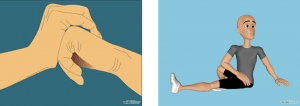My neck and knees sound like gravel and my joints pop and click – is that okay? It is not unusual for our joints to make noises when we move. Typically, this is nothing to worry about, especially if the noise is not associated with pain.
There are different types of noises you may experience. Common ones include:
Popping/Cracking
For instance, intentionally cracking your knuckles, ankles or neck, or you get a pop when you stretch and move. This is actually called “cavitation”. Historically it has been believed that as your joint is being expanded/stretched; the space within the joint is increased and the pressure in the joint drops. This pressure drop causes carbon dioxide to be released and it is this release that creates the crack or pop. More recent research suggests that the pop is due to rapid separation of the joint surfaces with subsequent cavity formation that forms the pop.
It is common for people to crack their knuckles or even their back on purpose because they find that it feels good or allows them to move more freely. You are not, however, putting bones “back in place”. Other than with true dislocations or subluxations, our bones don’t get out of place and need to be “put back in”.
Another reason your joints may pop is due to increased ligament laxity. Some people have looser ligaments than others. Ligaments provide passive structural support for our joints whereas muscles provide active support for our joints. A person with increased ligament laxity or looseness makes has joints that are more susceptible to increased motion within the joint and therefore increased ability pop.
There is not substantial evidence to suggest that popping your joints will lead to arthritis later. However, repetitive popping may lead to some increased or hyper- mobility at that joint which can make that joint more susceptible to injury. So constantly popping the same joint is not advised.
Snapping:
These sounds can be created by ligaments or tendons quickly snapping over bones or other tendons. A common area for this to happen is in your hip, or ankles. Stretching, or rolling on a foam roller or ball to loosen up the muscles in the area can help to reduce this snapping.
Grinding/sandpaper sounds:
This is called “crepitus”. This sound occurs when 2 rough surfaces rub together. As we age the cartilage surrounding our bones that allows our joints to move smoothly can deteriorate from wear and tear or trauma. A good example of this is when the cartilage on the back of your knee cap stats to wear away and you hear the grinding sound going down steps. Crepitus if not painful is fine to move and exercise through, but does indicate some degenerative changes are occurring in the joint.
Can I stop these noises?
In general – maintaining appropriate flexibility (but not overstretching), building and maintaining your muscle strength around each joint, and keeping yourself at a healthy weight will all help to take stress off your joints; and may lead to less popping, cracking, snapping and grinding over time.
When should I seek care?
It these noises are accompanied by pain, it may be prudent to have them checked out. Joint noises can also come from such structures as a torn meniscus in the knee, or torn labral cartilage in the hip or shoulder.
We wanted to thank Amira Ranney, Owner of Mountain Physical Therapy Services for contributing this article for our newsletter.

